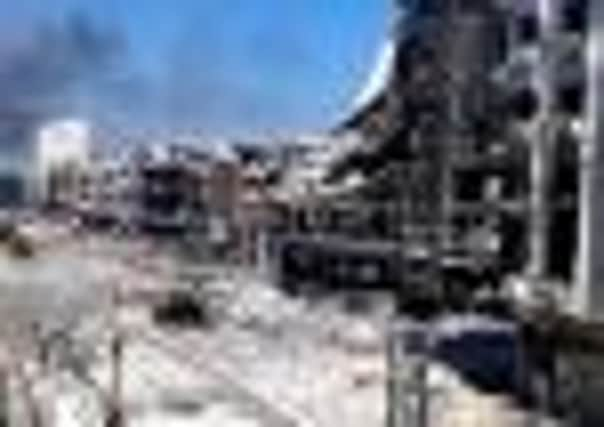Leaders: A tentative step towards peace in Syria


Although both sides have violated its terms, conditions are so violent it would be unrealistic to expect total observance. It is an achievement that any diminution of hostilities has been brought about. Last week Kofi Annan’s peace plan was already being written off, but, against expectations, a significant reduction in the level of violence has, at least temporarily, been attained. The imperative need is to reach some kind of accommodation to secure a civilised future for the people of Syria.
There are intricate geopolitical and religious interests involved. The simplistic “democracy versus tyranny” interpretation is a travesty of the reality. The world has a responsibility to consider carefully the consequences of precipitate removal of the Assad regime – especially with the example of Iraq and emerging problems in post-revolutionary Egypt and Libya. A frequently heard slogan at anti-government demonstrations in Syria is “The Alawite to the coffin and the Christian to Beirut!” Since those two minorities represent 10 per cent of the population, that threat of genocide and expulsion not only presages a massive upheaval if the opposition triumphs, but guarantees the Assad dynasty a support base motivated by survival.
Advertisement
Hide AdAdvertisement
Hide AdThe opposition is fractured into three main factions and many splinter groups, some of which are accused by Human Rights Watch of kidnapping, torture and murder. Saudi Arabia and Qatar are the two states most aggressively supporting the opposition: neither is a natural champion of democracy, but both are promoting Wahabbism, the strict observance version of Sunni Islam, the religion of the Syrian majority. Iran, in contrast, is proselytising for Shiite conversions, which has enraged the Sunni. Iran supports the Alawite Assads because of their Shiite allegiance. Hezbollah is in there too, supporting Assad; al-Qaeda has declared jihad against the secular Syrian state. There are some strange allies there for the Syrian opposition, let alone William Hague.
The key player is Turkey, in its neo-Ottoman identity, seeking hegemony in the region. For decades the Assad regime hosted the Kurdish PKK terrorists who launched attacks into Turkey; now Turkey has provided the Free Syrian Army with bases. There are already 24,000 Syrian refugees in Turkey, providing Ankara with a strong incentive for military intervention. If it recognised the Syrian National Council as legitimate government, it would have a pretext for invasion under the terms of a 2010 agreement signed, ironically, by Bashar al-Assad, allowing the two nations to conduct anti-terrorist operations on each other’s territory. Turkey could then invoke Article 5 of the Nato Charter, by which an attack on one member requires a response from all.
A solution to the Syrian crisis depends on allowing the parties involved to save face and conserve their interests, notably Russia and Turkey. While Assad must go, that process can best be achieved by detaching key elements of the regime from him and putting cast-iron guarantees in place for the safety of minorities. The best vehicle for progress is the new constitution approved by referendum last February. UN monitors should supervise elections giving that paper reform real force, with world opinion demanding the peaceful co-operation of opposition groups.
Many paths to follow
THE Gore-Tex Scottish National Trail may not be the most romantic-sounding concept, but it will offer a helpful facility to many thousands of Scots and visitors.
The 373-mile long scenic trail, reaching from the Borders to Cape Wrath, is named after the company providing sponsorship and plaques advertising its brand, and links with shops selling its products will be displayed along the route.
There will be an outcry from some quarters against this commercialisation of natural beauty. But such a reaction is unfair. Once the concept of signposted routes for visitors has been conceded – outraging those who believe such regimentation is a desecration of the wilderness – the messages need to meet standards, but that should not preclude company names.
There is no environmental difference between a notice proclaiming that a trail has been funded by Scottish Natural Heritage and one crediting Gore-Tex, provided neither notice is intrusive. Since copper plaques are being used on the Gore-Tex trail they are unlikely to be hoarding-sized.
In a recession, any funding contribution in the public interest is to be welcomed. There will, of course, be some free spirits who disdain all set routes and branch out on their own. Scotland’s outdoors community is a broad church, and rightly so.